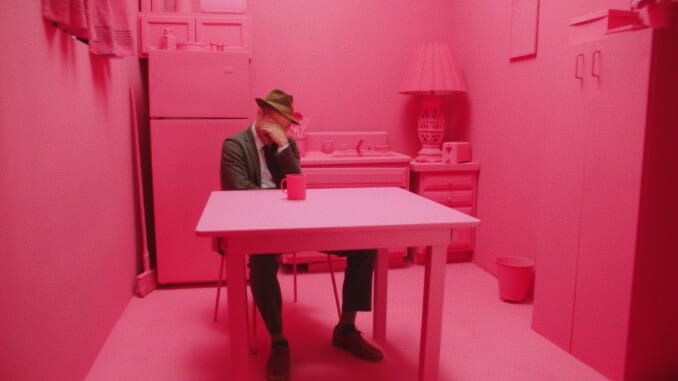Strawberry Mansion Exists in a Delectable Dreamscape

The intangible logic of our subconscious minds is what fuels Strawberry Mansion, a dazed and dreamy jaunt through nostalgic reverie and existential anxieties. Co-directed by Albert Bimey and Kentucker Audley (who also stars), the film is an exercise in creating a dreamscape by way of capturing texture—a venture that renders enthralling, gorgeous and unsettling images as a result. Not only is Strawberry Mansion a genuine feast for the eyes, but its plot is far more cohesive and calculated than most dream-like narratives care to strive for. This ensures that none of the audience falls into their own movie-induced slumber while also serving as a boon to the project’s ethos—one that desperately urges us to pay close attention to the details and potential meanings of our dreams, as they might just be the very key to our survival.
Set in the not-so-distant future, Strawberry Mansion follows James Preble (Audley), an auditor who works for a governmental agency that regulates “dream taxes,” a result of ads being projected into our most intimate mental moments. When he arrives at a sprawling Victorian abode with a magenta exterior, he believes he’s simply making a routine house call to address unpaid back taxes. An eccentric older woman named Bella (Penny Fuller) answers the door, and says she’ll only allow the tax man inside if he complies with her code: “To enter, you must lick the ice cream cone.” A bite-sized scoop of strawberry ice cream sits atop a small sugar cone—and though he’s reluctant at first, James eventually relents and licks the ice cream cone, a decision which effectively begins his odyssey of wading through thousands of VHS tapes containing Bella’s dreams. While he’s officially meant to be viewing these in order to collect data, he begins to fall in love with the younger version of Bella (Grace Glowicki) that serves as her constant avatar in dreamland. In fact, the auditor is so smitten that he hardly realizes the conspiracy he’s unwittingly landed himself within, spending all day in a clunky headset instead of piecing together the significance of how advertising and unpaid taxes converge.
There’s a clear anti-capitalist slant embedded in the film’s very fiber. Strawberry Mansion boldly depicts our society’s obsession with bureaucracy and profit in order to dismantle the tandem threat of boredom and violence that ascribing to these social structures entails. Concepts of work, forced technological obsolescence and rigid regulations are successfully critiqued while never feeling too lucid, allowing the primal conflict that these expectations impose on our most basic wants and desires to radiate through the viewer. The sheer thought of a lanky man in a cheap suit watching our most personal internal moments is icky enough, never mind the idea that product placement and commercial breaks could ever make their way into our subconscious. However, what really drives Strawberry Mansion home is the relative feasibility of its premise—after all, targeted ads seem to already be capable of reading our minds—making any surreal imagery it conjures all the more rooted in our very real anxieties concerning the future of surveillance and privacy.
-

-

-

-

-

-

-

-

-

-

-

-

-

-

-

-

-

-

-

-

-

-

-

-

-

-

-

-

-

-

-

-

-

-

-

-

-

-

-

-








































